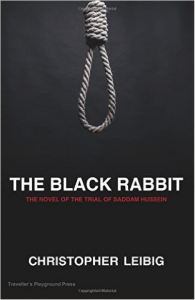×
 When the CIA asks 36-year-old public defender Malcom X Heinlein to represent a minor co-defendant at the trial of Saddam Hussein, he thinks he is being chosen because of his murky history with 30-year-old Ayesha Qaddafi, trial counsel for Saddam and daughter of President Qaddafi.
When the CIA asks 36-year-old public defender Malcom X Heinlein to represent a minor co-defendant at the trial of Saddam Hussein, he thinks he is being chosen because of his murky history with 30-year-old Ayesha Qaddafi, trial counsel for Saddam and daughter of President Qaddafi.
Malcom and his partner Sofia soon learn that their client, a former Saddam body double, wants desperately to testify against the tyrant in exchange for freedom for himself and his family in America. At first, arranging the plea bargain seems almost too easy. But nothing, except dying, is easy in Iraq.
Book Club Questions for The Black Rabbit
- At the beginning of the novel, Malcolm argues to the court that it should take his client’s word over DNA evidence. What is your gut reaction about whether scientific evidence like DNA is infallible enough to supplant traditional forms of justice-seeking such as testimony? Can this be taken too far? When you read that section, did you think Martino was guilty?
- Early in the novel Malcolm and Sophia listen to a Vietnamese bartender tell a story about a tennis match he saw between Andre Agassi and Michael Chang in the ‘90’s. The story focuses on the difference between the emotional players and the unemotional umpire. When the bartender suggests that Malcolm would be happier if he were more like the umpire, Sophia points that he cannot because “Americans are infatuated with the players.” What did Sophia, who is Pakistani, mean by this? Is it true? If so what does that say about Americans?
- Malcom’s parents, one of whom was a potentially unstable sixties radical serving time for murder, named him after Malcom X. To what extent can a name define a person’s life? Did Malcolm do things because of the name? In spite of it?
- Ayesha Qaddafi had a past acquaintance with Malcolm and possibly owes him a substantial favor. Or does she? Are there such thing as unspoken favors? Or must a favor be its own reward? Did Ayesha plan to repay Malcolm is favor all along or did she do it only when he forced her hand?
- Out of the following characters – Malcolm, al-Juhi, Raul, Whitestone, and Jabbouri – who is the most honorable? The least? The strongest? The weakest?
- What did Malcolm hope to achieve by going to Iraq? By staying after Sophia was shot? Was he trying to prove something or just finishing a job?
- Was the end result of Blackrabbit, that al-Juhi and Saddam both lived and the world was fooled, a just one? Would more good come of Saddam’s death had Malcolm exposed the plot? Or did he choose right?
- Throughout the book, what was Sophia’s overriding motive?
- The Blackrabbit was originally released in 2010 under a different title. That was before the downfall of Qaddafi and other major world events. Does the book look different now? Prescient or foolish?
- Was al-Juhi, who, after all, was a Saddam henchman for years, a moral character? Or just a smart one?
